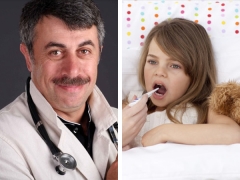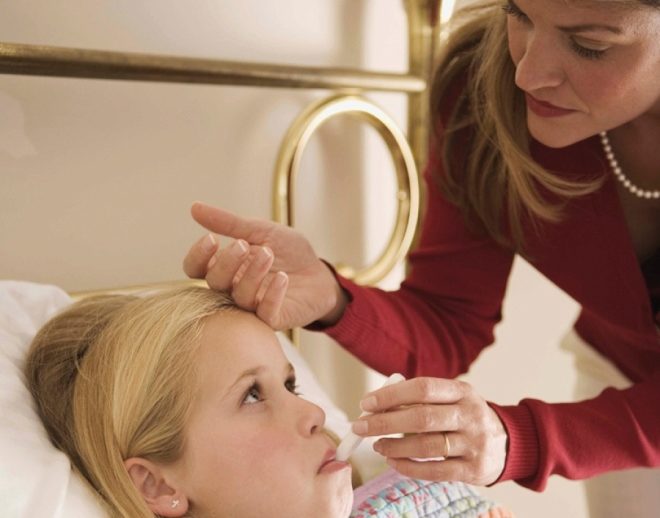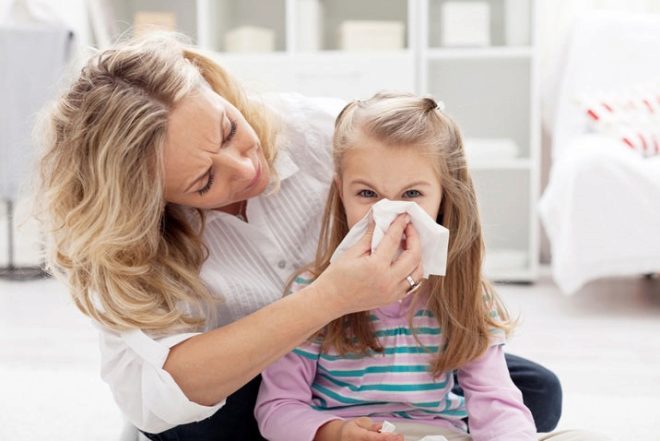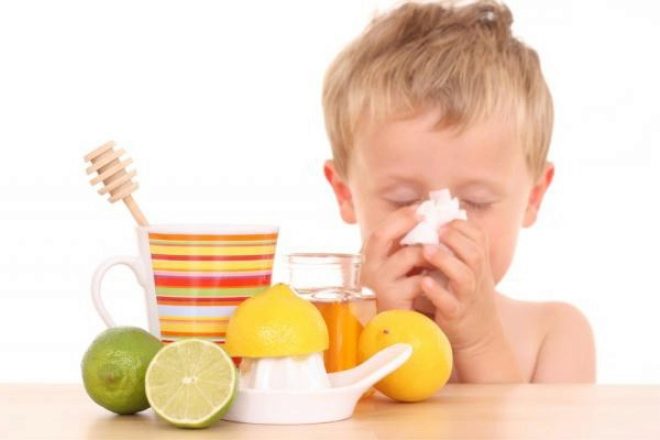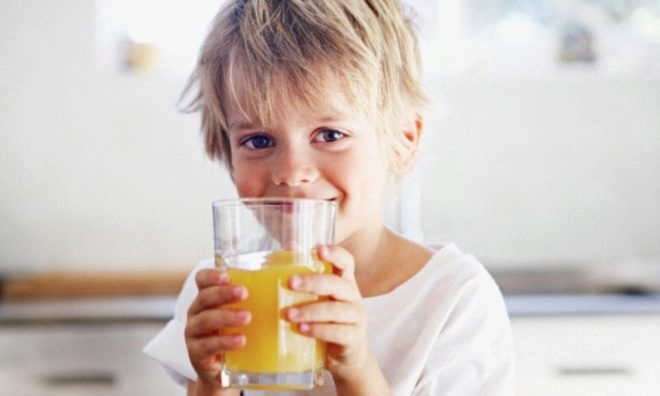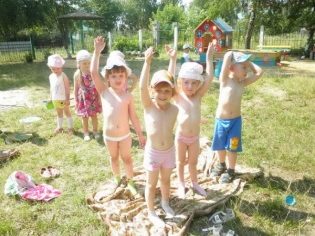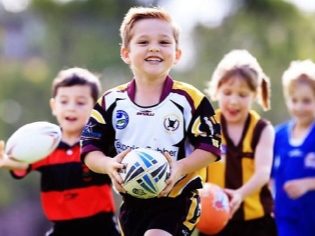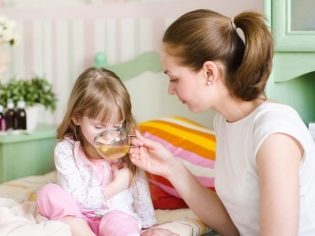Dr. Komarovsky about what to do if the child is sick often?
The kid goes to the kindergarten for a week, and then the month sits at home with snot, cough, fever, rash. This picture is not fictional, but the most real for many Russian families. A child who is sick often surprises no one today. Rather, a child is of genuine interest, which does not get sick at all or does so extremely rarely. What to do if frequent ailments do not give the baby a normal visit Kindergarten, caregivers call the child “Nesadikovsky”, and parents are constantly forced to take sick leave to diligently treat another ailment of their son or daughter, says a well-known pediatrician and author of books on children's health Yevgeny Komarovsky.
About the problem
If the child is often sick in the kindergarten, modern medicine says that he has lowered immunity. Some parents are sure that you need to wait a bit, and the problem will be solved by itself, the baby will “outgrow” the disease. Others are buying pills (immunostimulants) and are trying with all their might to raise and maintain immunity. Yevgeny Komarovsky believes that those and others are far from the truth.
If a child is sick 8, 10 or even 15 times a year, this, according to the doctor, does not mean that he has an immunodeficiency state.
The real congenital immunodeficiency is an extremely rare and extremely dangerous condition. With him, the child will be sick not so much of an ARVI, but an ARVI with severe leaks and very strong bacterial complications that are life-threatening and difficult to treat.
Komarovsky emphasizes that genuine immunodeficiency is rare, and You should not attribute such a severe diagnosis to a whole healthy child, who simply more often than others has flu or ARVI.
Frequent illness is a secondary immunodeficiency. This means that the baby was born completely normal, but under the influence of certain circumstances and factors, its immune defense does not develop quickly enough (or something is depressing it).
There are two ways to help in this situation: try to maintain immunity with drugs or create conditions under which the immunity itself begins to strengthen and work more efficiently.
According to Komarovsky, it is very difficult for parents to even admit the idea that the child is not guilty of everything (and not the peculiarities of his body), but they themselves, mom and dad.
If a crumbs from birth are muffled, do not allow the baby to walk barefoot around the apartment, always try to close the vents and feed them more, then there is nothing surprising and unusual in that he gets sick every 2 weeks.
What drugs can strengthen the immune system?
Medicines do not achieve the goal, says Yevgeny Komarovsky. There is no such medicine that would treat “bad” immunity. As for antiviral drugs (immunomodulators, immunostimulants), their action has not been clinically proven, and therefore they only help their own manufacturers, who earn on the sale of such funds trillions of net profits every cold season.
Immunoglobulin preparations (a specific protein that is produced in the human body during the immune response to the invasion of a foreign agent) generally lead to a paradoxical situation. The more often the parents treat the sick ARVI or Colds a child with such drugs, the more they are given for prophylaxis, as is strongly demanded by advertising, the more often and harder is this child. This happens because the baby’s own immunity begins to “be lazy.”
And indeed why should he work, “memorize” viruses, produce antibodies to them, if the immunoglobulin in horse doses comes from outside - thanks to the efforts of caring parents!
Today, homeopathic medicines are widely advertised, which, according to manufacturers, help to cope with the flu and acute respiratory viral infections in a few days, and also protect the child when everyone around is sick. Komarovsky repeatedly warned parents not to allow himself to be deceived. Proven efficacy of these tools do not possess.
Most often, they are simply harmless, but also completely useless "dummies." If there is an effect, it is only the placebo effect. The names of such drugs are on everyone's lips - "Anaferon», «Oscillococcinum», «Immunokind" and so on
About strengthening immunity folk remedies Komarovsky responds quite skeptical. If this drug does not harm the child, take health. This can be attributed to juices, tea with lemon, onions and garlic, cranberries. However, do not talk about the therapeutic effect. All these folk remedies are natural immunomodulators, their benefits are based on the beneficial effects of the vitamins they contain. Cure flu or rotavirus infection, which is already developing, onions and garlic can not. There will be no preventive protection from them.
It is strictly not recommended to practice folk methods that can harm. If you are advised to drip iodine into milk and give it water to the child, if it is recommended to rub it with badger fat, kerosene or vodka at a temperature, say a decisive parent "no." Doubtful and very expensive means of crushed horns of the Tibetan goat - "no." Common sense is paramount.
Medicines to strengthen the immune system as such does not exist. However, this does not mean that parents can in no way influence the natural defense system of their offspring. They can come to the aid of a logical and simple sequence of actions that are designed to change the lifestyle and conditions of the child’s environment.
Why does the baby start to hurt?
90% of children's ailments - a consequence of exposure to viruses, says Komarovsky. Viruses are spread by airborne droplets, less commonly domestic.
In children, the immunity is still immature, it only has to meet with many pathogens, to develop specific antibodies to them.
If one child came to the kindergarten with signs of infection (runny nose, cough, tickling), then in a closed team, the exchange of viruses will be as efficient as possible. However, not everyone gets infected and gets sick. One will fall into bed the next day, and the other will care nothing. The case, according to Yevgeny Komarovsky, is in a state of immunity. A baby who is already healed by parents is more likely to get sick, and the danger will pass by the one who is not given a bunch of pills for preventive purposes, and one who grows in the right conditions.
Needless to say, simple hygiene rules are violated in kindergartens, no air humidifier, hygrometers, and the tutors don't even think about opening a window and airing (especially in winter). In a stuffy group with dry air, viruses circulate much more actively.
How to examine the state of immunity?
Some parents believe that if their baby is sick more than 8 times a year, then he certainly has poor immunity. Norms of morbidity, according to Komarovsky, does not exist.Therefore, testing for immunodeficiency requires more parents to calm down, realizing that they are “doing everything possible” than the child himself.
If you really want to pay for it and learn a lot of new medical terms, then welcome to any paid or free clinic. There you will be prescribed a blood test for antibodies, the child will be scraped for eggs worms, tests for giardia, make a general analysis of blood and urine, as well as offer a special method of research - the immunogram. Then the doctor will try to summarize the data and assess the state of the immune system.
How to improve immunity?
Only by eliminating the child’s conflict with the environment, one can hope that his immunity will begin to work more actively, with the result that the number of diseases will decrease significantly. Parents Komarovsky recommends starting with creating the right microclimate.
What to breathe?
The air should not be dry. If the child breathes dry air, the mucous membranes of the nasopharynx, which viruses attack in the first place, will not be able to give a decent “answer” to the disease-causing agents, and the already beginning respiratory tract disease will result in complications. Optimally, if at home, and in the garden will be clean, cool and humid air.
The best humidity values are 50-70%. Buy a special device - a humidifier. In the extreme case, get an aquarium with fish, hang (especially in winter) wet towels and make sure that they do not dry out.
Put a special valve on the radiator.
A child should not breathe air in which there are undesirable aromas for him - tobacco smoke, evaporation of varnishes, paints, chlorine-based detergents.
Where to live?
If the child began to get sick often, this is no reason to curse the kindergarten, and it's time to check whether you yourself have properly equipped the nursery. In the room where the child lives, there should be no dust accumulators - large soft toys, carpets with a long nap. Wet cleaning in the room should be done with ordinary water, without adding any detergents. It is advisable to buy a vacuum cleaner with a water filter. It is necessary to air the room more often - especially in the morning, after night. The air temperature should not exceed 18-20 degrees. Toys of the child should be stored in a special box, and books - on the shelf behind the glass.
How to sleep?
The child should sleep in a room where it is necessarily cool. If it is scary to immediately lower the temperature in the room to 18 degrees, then it is better to wear pajamas warmer on the child, but still find the strength to bring the temperature back to normal.
Bed linen should not be bright, containing textile dyes. They may be additional allergens. It is better to buy linen from natural fabrics of classic white color. Wash and pajamas, and bedding often sick son should be baby powder. It is also worth subjecting things to extra rinsing.
What to eat and drink?
It is necessary to feed the child only when he begins to beg for food, and not when his mom and dad decided that it was time to eat. In no case can not feed the child forcibly: a healthy immunity in an over-fed child does not happen. But the drink should be abundant. This does not apply to carbonated sweet lemonade. The child needs to be given more water, non-carbonated mineral water, tea, fruit drinks, compotes. To know the needs of the child in the liquid, multiply the weight of the child by 30. The resulting number will be the desired one.
It is important to remember that drinking should be at room temperature - so the fluid will be absorbed faster in the intestine. If earlier the child tried to drink lukewarm, then the temperature should be gradually reduced.
How to dress?
The child must be properly dressed - not to muffle and not to supercool. Komarovsky says sweating causes disease more often than hypothermia. Therefore, it is important to find the "golden mean" - the necessary minimum of clothing.To define it is quite simple - there should not be more things on a child than on an adult. If earlier in the family the “grandmother's” dressing system was practiced (two socks in June and three in October), then the amount of clothes should be reduced gradually so that the transition to normal life does not become a shock for the child.
How to play?
Toys for the preschooler - an important component of development. Parents should remember that babies take them in their mouths, nibble, lick. Therefore, the choice of toys must be approached responsibly. Toys should be practical, washable. They should be washed as often as possible, but with plain water, without chemicals. If a toy smells badly or sharply, it cannot be bought, it can be toxic.
How to walk?
A child should walk every day - and not just once. Dr. Komarovsky considers very useful evening walks before bedtime. You can walk in any weather, dressing adequately. Even if the child is sick, this is not a reason to refuse to walk. The only limitation is high temperature.
Hardening
Komarovsky advises hardening a child with weak immunity. If you approach this carefully and make tempering the usual daily norm of life, then pretty quickly the frequent diseases brought from the garden can be forgotten.
Best of all, the doctor says, start practicing tempering procedures from birth. This walk, and cool baths, and douche, and massage. If the question of what is needed to improve immunity, has arisen only now and immediately to his full height, then radical action is not necessary. Events should be introduced alternately and gradually.
First, write down the child in the sports section. Fighting and boxing for an often sick child will not work, because in these cases the child will be in a room where many other children breathe and sweat besides him.
It is better if the son or the daughter goes in for active sports in the open air - athletics, skiing, cycling, figure skating.
Swimming, of course, is very useful, but for a child who is sick very often, visiting the public pool is not the best solution, says Yevgeny Olegovich.
Additional education (music schools, art studios, foreign language learning circles when classes are held in confined spaces) better to put it off until later when the number of diseases of the child will decrease at least 2 times.
How to relax?
The widespread view that the sea air has a very beneficial effect on a child who is often sick is far from reality, Komarovsky says. It is better to send the child to relatives in the summer in the village, where he can breathe fresh air, drink well water and swim in it, if you fill it with an inflatable pool.
It is necessary to forbid village relatives to feed the child “for slaughter” with sour cream and pancakes. Food should be given only when he asks for it. Such vacations lasting 3-4 weeks are usually quite enough to ensure that immunity, badly undermined by city life, is fully restored.
How to protect yourself from diseases?
The best prevention, according to Komarovsky, is not a mountain of pills and synthetic vitamin complexes. First of all, contact should be limited during seasonal epidemics of viral infections. You should not go by public transport, to visit large shopping centers, circuses and cinemas.
All family members of a frequently ill child must be vaccinated against the flu, and everyone (including the child) should wash their hands more often, especially after returning from the street. For walks, one should choose not playgrounds in the yard, where there are many children, but less crowded parks, squares, alleys.
How to treat?
Viral disease does not require special treatment. If a child brought a regular runny nose with a cough from kindergarten, it is safe to say that he has a viral infection. Treatment should be in compliance with the above rules - plenty of warm drink, clean and humid air, walking, moderate nutrition, moisturizing the mucous membranes of the nasopharynx with the help of instillation of saline solutions. As a rule, the infection disappears after 5-7 days after the onset.
After recovery, Komarovsky does not advise immediately to take the child to kindergarten or send a teenager to school. Immunity, which is weakened by a recent illness, will not be able to adequately respond to a new virus, and the child will “bring” another illness. Leaking second disease will be more difficult than the first. It is better to sustain a pause of 7–10 days after recovery, give immune protection to strength, and only then resume the visit to the preschool, school, section.
Tips for parents of “Nesadik” kids
"Nesadikovskih" kids do not happen. There are parents who do not understand how to resist the incidence and maintain immunity.
A child will become completely “sadikovsky” if, during the next 3-4 episodes of acute respiratory viral infections, the parents will not give him pharmaceutical medicines, carry on doctors, do inhalation and soar the legs in a basin of hot water.
If he alone (on compotes and fruit drinks) cope with diseases, his immunity learns to counter threats from the outside, and the likelihood that the next time he gets sick, picking up the virus in kindergarten will be minimal.
If parents are going to make a gift to the kindergarten for another important holiday, then try to convince other parents who are planning to participate financially in it, to buy a collected humidifier for the collected funds. From such an acquisition, it will be better and easier for all children - both often ill and strong. This is prevention, and treatment, and just the creation of normal conditions in a preschool institution.
More will tell Dr. Komarovsky in the video below.
